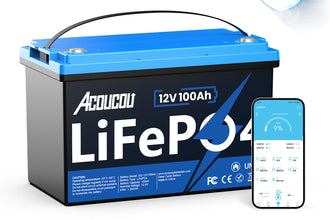

The impact of cold weather on LiFePO4 batteries is a common concern for many users. While LiFePO4 batteries are known for their excellent performance in cold temperatures compared to other lithium-ion battery chemistries, there are still some important considerations to pay attention.
How Cold Weather Affects LiFePO4 Batteries
- Reduced Capacity
Cold temperatures can reduce the capacity of LiFePO4 batteries. The chemical reactions within the battery slow down in colder temperatures, resulting in a reduced available energy. This means that the battery may not deliver its full capacity or runtime when operating in cold weather.
- Increased Internal Resistance
Cold weather can increase the internal resistance of LiFePO4 batteries. At low temperatures, the diffusion ability of charged ions in positive and negative electrode materials deteriorates, making it difficult to penetrate the passivation film between the electrode and electrolyte. The speed of transfer in the electrolyte also decreases, and additional heat is generated during the transfer process. After lithium ions reach the negative electrode, their diffusion inside the negative electrode material becomes less smooth. As a result, it may be slightly more challenging for the battery to deliver power at its maximum efficiency. This can lead to a slight reduction in overall performance.
- Voltage Sag
Cold temperatures can cause a voltage sag during high current draw situations. When the battery is subjected to sudden high loads, the voltage may momentarily drop due to increased internal resistance. This can impact the performance of devices or systems relying on a stable voltage supply.
- Slower Charging Speed
LiFePO4 batteries may take longer to charge in cold weather due to reduced chemical activity and slower reaction rates. Charging times may be extended, especially if the battery is significantly cold.
Will Lithium Batteries Freeze
Lithium batteries will not freeze into a solid state. Although the freezing point temperature can affect its performance, lithium batteries do not solidify when exposed to temperatures below the freezing point. However, the ability of batteries to power devices at freezing temperatures may be greatly hindered and shortened.
What temperature can cause damage to lithium batteries
Understanding the optimal operating temperature of a battery is important for its lifespan and efficiency, in order to reduce the frequency of battery replacement. Although Acoucou Batteries can operate at temperatures between -20 ℃ and 45 ℃, the optimal operating temperature for batteries should not be lower than 0 ℃, otherwise it may cause certain damage to the battery.

Tips for using in cold weather
- Insulation: Using insulation such as foam or thermal wraps can help retain heat and prevent rapid cooling of the battery. Insulating the battery can help maintain a more stable temperature during cold weather conditions.
- Battery Blankets: Specialized battery blankets or heating pads designed for lithium batteries can be used to provide gentle warmth and prevent the battery from getting too cold.Or placing the batteries inside insulated enclosures or compartments can shield them from direct exposure to cold air and wind, helping to maintain a more moderate temperature.
- Active Heating Systems:Some advanced battery management systems include active heating elements that are designed to regulate the temperature of the batteries. These systems can automatically warm the batteries when needed, ensuring they operate within the ideal temperature range.
- Use of Warmers:In situations where batteries are exposed to extreme cold, portable warmers or heated packs can be placed near the batteries to provide additional warmth. Care should be taken to ensure that the heat source does not exceed safe temperatures for the batteries.
- Keep the battery in a warmer environment:If possible, store your batteries indoors in a dry and temperature-controlled environment. This can be a heated garage, basement, or other indoor location that maintains a moderate temperature range.

Despite these effects, LiFePO4 batteries still perform better in cold weather compared to other lithium-ion chemistries. They have a wider operating temperature range such as the operating temperature of Acoucou: -20℃ to 45℃. Additionally, Acoucou has the smart BMS with low-temperature charging cut-off. You can look other storage tips from here.










